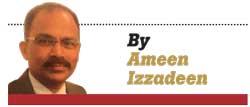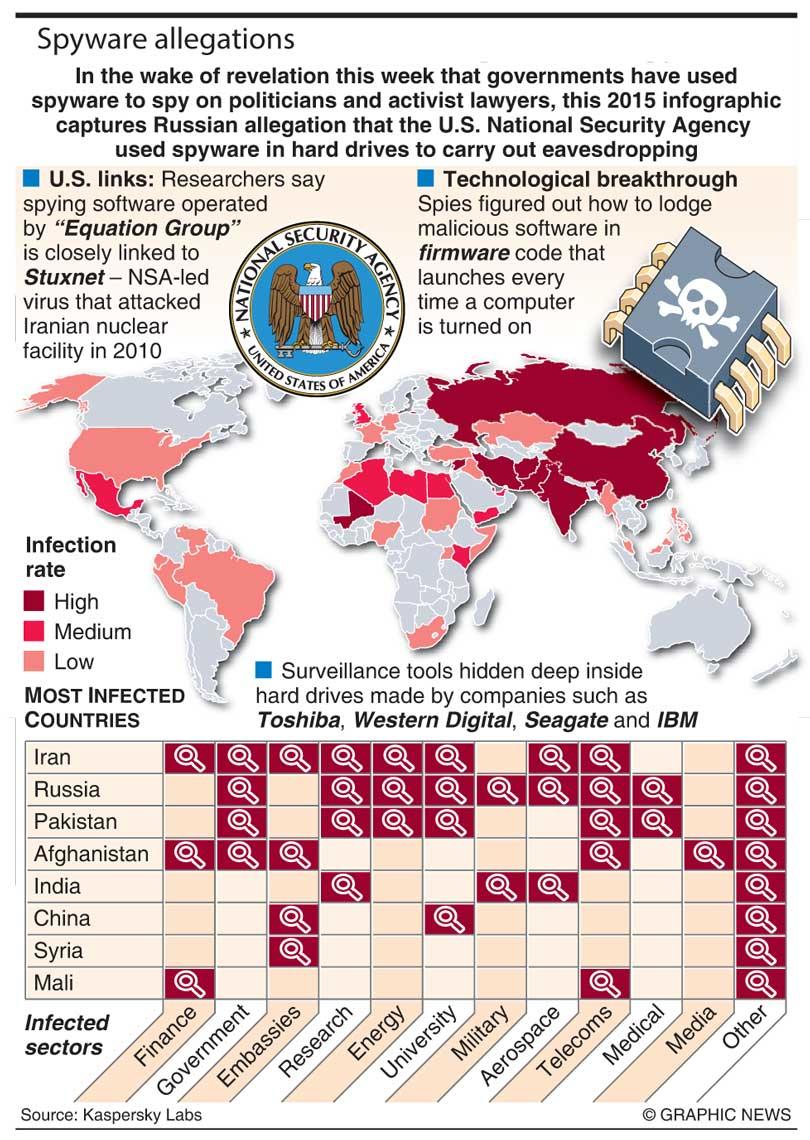23 Jul 2021 - {{hitsCtrl.values.hits}}
 A man tells his wife that he thinks their electronic items are spying on them. “Nonsense,” said the wife. The man laughed. His wife laughed. Siri laughed. Alexa laughed.
A man tells his wife that he thinks their electronic items are spying on them. “Nonsense,” said the wife. The man laughed. His wife laughed. Siri laughed. Alexa laughed.
The TV laughed and even the new digital toaster laughed. Jokes apart, we are being spied on by gadgets and the dystopian world is increasingly becoming a reality. Following an exposé based on painstaking research by the UK-based Guardian and 16 other independent newspapers on leaked data, it is now certain that our governments have been spying on us with the help of spyware developed and supplied by companies in technologically advanced countries. In a report on Sunday, the Guardian website said human rights activists, politicians, journalists and lawyers had been targeted by authoritarian governments using hacking software sold by the Israeli surveillance company NSO Group. The media investigation suggests widespread and continuing abuse of NSO’s hacking spyware, Pegasus, which the company insists is only intended for use against criminals and terrorists. Pegasus is a malware that infects iPhones and Android devices to enable operators of the spyware to extract messages, photos and emails, record calls and secretly activate microphones.
Among those who have been identified in the Guardian exposé as being spied upon are presidents, prime ministers and kings. They include French President Emmanuel Macron, South African President Cyril Ramphosa and Pakistans Prime Minister Imran Khan. On March 24, this year, outspoken opposition politician Harin Fernando told Sri Lanka’s Parliament that the government had bought the Pegasus spyware. The government has not responded to Fernando’s claim. In the wake of the Guardian revelation, states which have been identified as NSO clients are either silent or have denied they were using the spyware to put politicians, human rights activists and journalists under surveillance. In India, protests have been raging since the publication of the Guardian article which only confirms what the opposition has been accusing Narendra Modi’s government of. Among the politicians who have been spied on is Congress leader Rahul Gandhi.
The Congress Party has slammed the Pegasus affaire as “an attack on the democratic foundations of our country”. While getting rid of touch phones and going back to first or second generation analog mobile phones may sound like worthy advice, the reality is we are trapped inside the defenceless world of touch phones. We will not part with our phones, though we know we are being watched, heard and tracked by the Orwellian Big Brother. Long obsolete are the secret listening devices like the bug the then US President Richard Nixon’s re-election campaign team tried to install in the telephones at the Watergate Democratic National Committee headquarters in 1972. Outdated are the secret cameras James Bond, upon entering a hotel room, would try to find with the help of a smart device given to him by MI6, Britain’s external spy agency. Highly invasive and sophisticated spying systems such as facial recognition systems have come to stay and deny us our right to privacy. Amnesty International says facial recognition systems are a form of mass surveillance that violate the right to privacy and threaten the rights to freedom of peaceful assembly and expression.
Governments which use facial recognition systems copy our pictures from our social media profiles without our consent or by hacking into driving licence or national identity card systems. The pictures are then fed into the system to match against our pictures captured on cctv cameras or video surveillance gadgets in public places. It is alleged that China is using this system to suppress Uighur separatism in its Xinjiang Province. Even the United States, the citadel of democracy, uses facial recognition systems ostensibly to prevent crimes, but human rights activists accuse the authorities of misusing the system to discriminate against the blacks and other marginalized communities. In many countries, there are laws to enable governments to carry out surveillance. But the US took the surveillance laws to extreme levels when the US Congress in 2001 in the aftermath of the 9/11 terror attacks, enacted the USA PATRIOT Act (Uniting and Strengthening America by Providing Appropriate Tools Required to Intercept and Obstruct Terrorism Act) to empower the authorities to tap phones and email communications. Thankfully, in the face of resistance from civil liberty activists, attempts to renew the law have not been successful since 2015, two years after whistleblower and former National Security Agency (NSA) data analyst Edward Snowden in a bombshell revelation exposed US surveillance programmes that operated in coordination with telecommunication companies.
The revelation triggered a nation-wide debate on the citizens right to privacy vis-à-vis the states right to invade privacy to protect citizens. Snowden now lives in Russia. In 2015, Russian researchers claimed that the NSA had devised a way of hiding spyware deep within hard drives made by top computer manufacturers, enabling the agency to eavesdrop on the majority of the world’s computers. Long before states resorted to spyware, George Orwell prophetically captured the dystopian scenario in his fiction 1984 published in 1949. The novel features a statecontrolled telescreen which the user cannot switch on or switch off. It is a disinformation TV and surveillance camera in one. Just as the Orwellian telescreen, today’s smart TVs collect information about you and send it to the manufacturer, whose data base can be accessed by hackers employed by spy agencies. Spyware is not exclusively for governments alone.
Not far away is the day when terrorists and criminal gangs develop such malware. The Pegasus leak comes at a time when cyber-attacks are taking the centre stage of relations between states. The US has been accusing Russia and China of carrying out cyber-attacks on US systems. Recently, in an attack the US attributed to Russian criminal gangs, the largest US oil pipeline had to be shut down for a week, causing, in its wake, power outages and fuel shortages. Also dangerously vulnerable to cyberattacks are nuclear plants, as regular Israeli cyber-attacks on Iranian nuclear facilities indicate. Who knows there will come a day when countries will have the technology to hack systems affiliated to the ballistic missiles and divert them in the midair perhaps with a deadly message ‘the package is returned to the sender’.
It is appalling that someone in a secret chamber is in control of our iPhones and Android devices and listening to our conversations and tracking us even when our phones are switched off. Needless to say, the Pegasus spyware has severely undermined civil liberties. Spywares and facial recognition systems have their uses for governments trying to protect people from terrorists and criminals, but should we the people have the right to privacy and the right to know we are being watched by our governments? Soon there will be a situation where spyware companies and governments will use secrets of our private lives to silence us or threaten us to carry out their orders. Given the sophistication of the rapidly developing spyware systems, it is high time human rights activists issued a call to governments to streamline spyware uses and bring them under the judiciary’s surveillance.

29 Nov 2024 44 minute ago
29 Nov 2024 52 minute ago
28 Nov 2024 28 Nov 2024
28 Nov 2024 28 Nov 2024
28 Nov 2024 28 Nov 2024